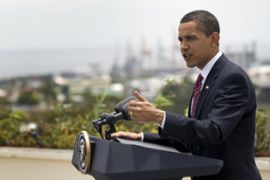Obama optimistic on Americas ties
US sees “positive signs” in ties with Cuba and Venezuela but calls for deeds to match words.

“I do believe that the signals sent so far provide at least an opportunity for frank dialogue on a range of issues, including critical issues of democracy and human rights throughout the hemisphere,” he said.
Cuba policy
Specifically on Cuba, Obama admitted that Washington’s half-century-old policy on the communist island “hasn’t worked the way we want it to; the Cuban people aren’t free”.
But that policy will not be changed “overnight”, he said.
“Issues of political prisoners, freedom of speech and democracy are important, and can’t simply be brushed aside,” he said, calling on Havana to release its political prisoners.
Fidel Castro, the former Cuban leader, reacted to the summit by urging Obama to end the economic blockade of the island which has been in place since 1962.
“The cruel blockade against the Cuban people costs lives and results in human suffering,” he wrote on the Cubadebate website on Monday.
Castro also critcised Obama’s remarks as “evasive and terse”.
The comments tempered speculation that a historic thaw in relations between the United States and Cuba – and with Cuba’s chief ally Venezuela – was on its way following conciliatory gestures by all three countries.
Handshake defended
The US president also defended his highly publicised handshake at the summit with Hugo Chavez, the Venezuelan president.
|
“We recognise that other countries have good ideas, too, and we want to hear them” Barack Obama, |
A vocal critic of the US, Chavez had likened George Bush, Obama’s predecessor, to the “devil”.
The handshake drew quick condemnation from US Republicans back home, but Obama brushed that aside.
He noted that Venezuela had a defence budget of about one-six hundredth of the size of the United States and owned Citgo, an oil company which operates in the US.
“It’s hard to believe we are endangering the strategic interests of the United States when he [the US president] talks with Chavez,” Obama said.
The trip to Trinidad was Obama’s first presidential journey to the region, and he said the meeting of heads of state had the potential to create greater progress on the economy, climate control and immigration.
As he did on a recent trip to Europe, Obama stressed that the United States was a willing partner, “inclined to listen and not just talk”, in trying to advance national interests.
“We recognise that other countries have good ideas, too, and we want to hear them,” he said, adding that the fact that an idea came “from a small country, like Costa Rica,” should not diminish its potential benefit.
Chavez gesture
Chavez approached Hillary Clinton, the US secretary of state, during the summit and said he was restoring his nation’s ambassador in Washington, voicing hopes for a new era in relations after exchanging greetings with Obama.
The Venezuelan leader told reporters he would propose Roy Chaderton, his current ambassador to the Organisation of American States, as the country’s new representative in a move towards improving strained ties with Washington.
Even Daniel Ortega, the president of Nicaragua and a critic of US policy, said he found Obama receptive to dealing with the issues raised.
Ortega said Obama “is the president of an empire” that had rules the president could change. Nevertheless, Ortega said: “I want to believe that he’s inclined, that he’s got the will.”